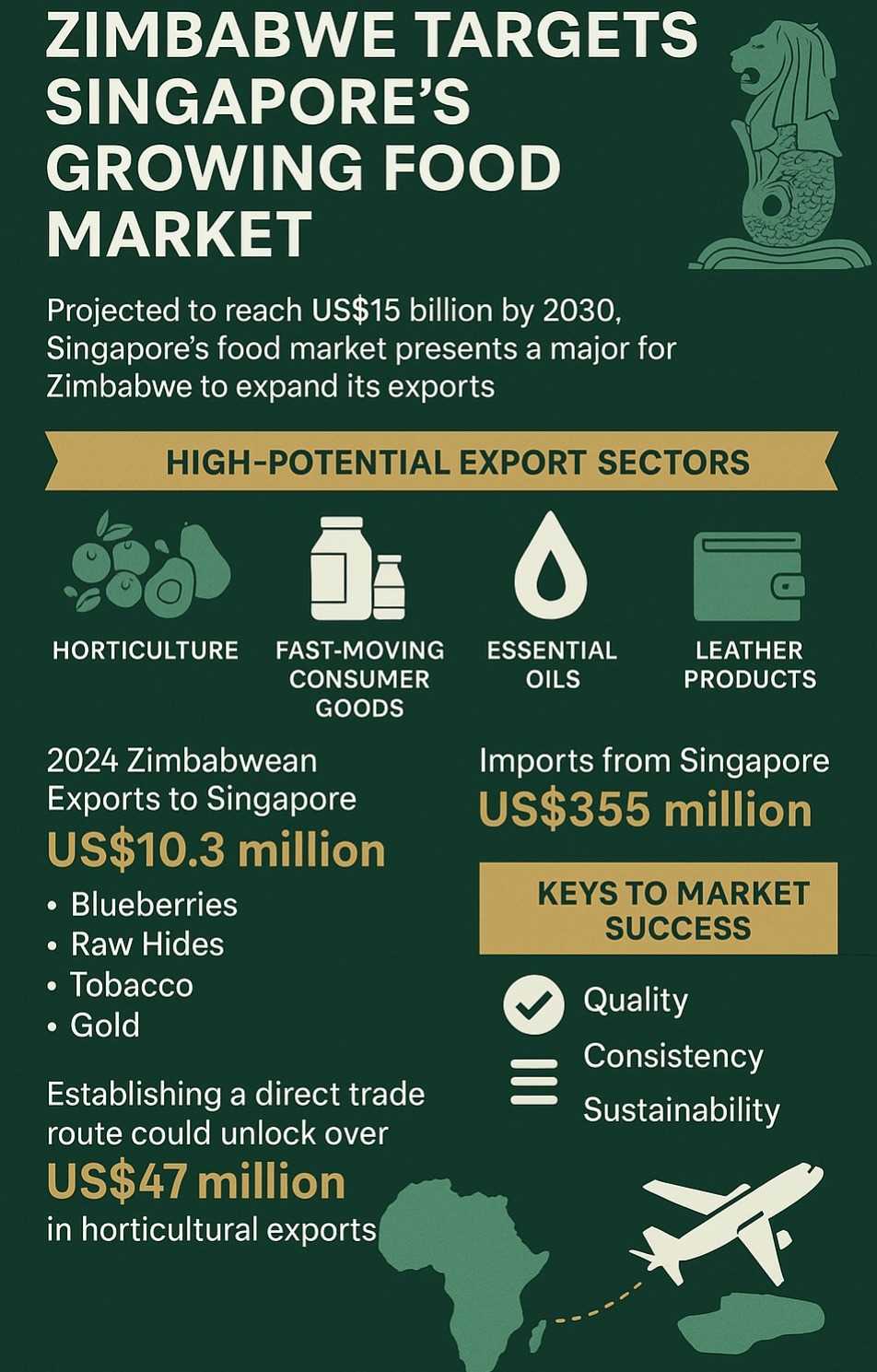
Zim Now Writer
Zimbabwean exporters have been urged to seize opportunities in Singapore’s booming food market, which is projected to reach US$15 billion by 2030. With Singapore importing 90% of its food—valued at over US$10 billion annually—this presents a significant opening for Zimbabwe to boost its exports, particularly in sectors where it holds a competitive edge.
The call was made by ZimTrade’s Director of Operations, Similo Nkala, during the Singapore Market Scan Dissemination Programme held in Harare. The event shared findings from market research conducted in March 2025, shedding light on trends and entry points into Singapore’s high-value economy.
The market scan highlighted several promising sectors for Zimbabwean exporters: Horticulture: blueberries, avocados, citrus fruits, and chillies
Fast-Moving Consumer Goods and essential Oils and Leather Products.
Singapore’s reputation as a global trading hub—with a GDP of US$501 billion, per capita GDP of US$84,734, and annual trade of US$1.2 trillion—further enhances its attractiveness for Zimbabwean exporters targeting quality-driven markets.
In 2024, Zimbabwe’s exports to Singapore totalled US$10.3 million, dominated by blueberries, raw hides, tobacco, and gold. In contrast, imports from Singapore reached US$355 million, exposing a wide trade imbalance. This gap, however, presents a strategic opportunity for Zimbabwe to increase its market share through value-added and diversified products.
Nkala stressed that establishing a direct trade route could unlock over US$47 million in horticultural exports. He noted the rising Singaporean appetite for organic and natural processed foods, which could spur growth in Zimbabwe’s processed food industry.
Related Stories
“Singapore is ready to embrace Zimbabwean products if we can deliver with unwavering consistency and scale,” Nkala said. “Let us turn market opportunities into thriving exports that will contribute to the country’s export vision of US$14 billion by 2030.”
Kupakwashe Midzi, ZimTrade Client Advisor for Export Development, echoed Nkala’s sentiments, saying success in Singapore hinges on meeting the market’s high standards.
“The Singapore Market Scan provided valuable insights into this cash-rich market. To succeed, exporters must adapt to the country’s high standards of quality, consistency, and sustainability,” Midzi noted.
Zimbabwe’s Ambassador to Indonesia, Martin Makururu, added that contract farming partnerships between Zimbabwean producers and Singaporean firms could enhance supply reliability and strengthen trade relations.
“There is a huge appetite for Zimbabwean produce, especially in horticulture,” said Ambassador Makururu. “Producers should collaborate with Singaporean firms to meet
Rusyaidi Radzi, Market Advisor for Africa, the Middle East, and South Asia at the Singapore Business Federation, confirmed that Zimbabwe is increasingly being seen as a viable partner for sourcing and supply chain collaboration.
“Singapore companies are eyeing Zimbabwe as a promising source of high-quality, reliable, and compliant products. The trade imbalance clearly shows untapped potential that Zimbabwe can leverage,” said Radzi.
As the global food market evolves and premium markets like Singapore demand sustainability and reliability, Zimbabwe has a chance to rise as a key supplier—if exporters can scale up and meet expectations.


















Leave Comments